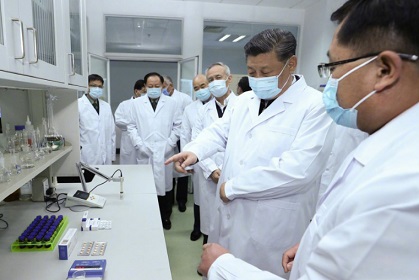BREAKING Research News! Canada Restricts Research Collaborations With Scientists From China, Russia And Iran. U.S. And Europe Expected To Follow Next!
Nikhil Prasad Fact checked by:Thailand Medical News Team Jan 18, 2024 2 years, 2 weeks, 3 days, 8 hours, 29 minutes ago
Research News: In a significant move to safeguard its national security interests and shield advanced technologies, Canada has recently announced stringent measures to ban research collaborations with scientists affiliated with universities primarily based in China, along with a handful from Iran and Russia. The decision, announced on Tuesday, marks a pivotal moment as Canada takes proactive steps to prevent sensitive research, including medical and health topics such as COVID-19, from falling into the hands of countries that may pose a threat to Canadian security.
https://www.swissinfo.ch/eng/canada-clamps-down-on-researchers-with-ties-to-china--iran--russia/49133080
 Canada Restricts Research Collaborations With Scientists From China, Iran and Russia.
Canada Restricts Research Collaborations With Scientists From China, Iran and Russia.
According to various sources and latest
Research News coverages, the United States, Europe and even Australia are expected to also follow next with similar restrictions.
The new regulations, devised by the government of Ottawa, focus on withholding government grants from researchers who have ties to universities linked to defense and security entities including health and medical issues in nations deemed as potential risks to Canada. While the list primarily targets Chinese institutions, it includes a select number from Iran and Russia. The ministers of innovation, health, and public safety issued a joint statement highlighting the need to balance the collaborative nature of Canadian-led research with the imperative to protect against foreign influence.
According to officials, the policy currently affects only federal funding. However, the Ottawa government expresses hope that it will serve as a guiding framework for provincial governments and Canadian institutions, encouraging them to adopt similar measures. The move is a response to the vulnerability of open collaborative research, which, while characterized by excellence, can attract foreign interference, as stated by the ministers.
This development is not isolated, as it comes on the heels of Canada's 2022 arrest and charging of a researcher with espionage for allegedly attempting to steal trade secrets to benefit China. Canada, being a member of the "Five Eyes" alliance alongside Britain, the United States, New Zealand, and Australia, aligns its policies with its international partners. The alliance's intelligence chiefs had previously accused China of engaging in intellectual property theft, utilizing artificial intelligence for hacking and spying against member nations, further solidifying the concerns addressed by Canada's recent measures.
The impact of these restrictions extends beyond Canadian borders, as the United States and Europe are expected to follow suit. The move reflects a growing global awareness of the risks associated with unrestricted international research collaborations, especially in fields critical to national security. Intellectual property theft, highlighted by the U.S. as a longsta
nding issue in its relations with China, has become a focal point in diplomatic discussions.
Furthermore, Canada's decision is fortified by its commitment to protecting cutting-edge science and advanced technology developed within its borders. The national security rules unveiled seek to prevent research outcomes from benefiting countries like China, Russia, and Iran, which may leverage the knowledge for military, national defense, or state security purposes. The reforms are designed to bar federal granting agencies and the Canada Foundation for Innovation from funding research in collaboration with institutions tied to defense or security bodies of countries posing a risk to Canada.
Media reports from the previous year highlighted longstanding collaborations between Canadian universities and a prominent Chinese army scientific institution. These partnerships involved numerous advanced-technology research projects, raising concerns about the potential contributions to China's defense sector in high-tech industries. The new measures aim to curtail such collaborations and mitigate the risk of sensitive knowledge transfer that could compromise Canada's national security.
As Canada takes the lead in implementing these stringent measures, the global scientific community awaits further developments, with the United States and Europe expected to follow suit. The evolving landscape of international research collaborations reflects the ongoing challenges countries face in balancing the pursuit of knowledge with the imperative to protect against potential security threats.
For the latest
Research News, keep on logging to Thailand Medical News.
